Last week @alexevansuk and I launched the #LongCrisisScenarios with @localtrust.
Four stories about worlds where we polarize or act collectively, centralize or give everyone a role.
A thread on some of the influences that fed the scenarios. [1/x] http://www.longcrisis.org/scenarios/ ">https://www.longcrisis.org/scenarios...
Four stories about worlds where we polarize or act collectively, centralize or give everyone a role.
A thread on some of the influences that fed the scenarios. [1/x] http://www.longcrisis.org/scenarios/ ">https://www.longcrisis.org/scenarios...
First @stewartbrand of the Long Now Foundation.
We build on his Layers of Change – proposed in How Buildings Learn.
"A hymn to entropy... kicking the stuffing out of the proposition that architecture is permanent and that buildings cannot adapt.” [2/x] https://www.penguinrandomhouse.com/books/320919/how-buildings-learn-by-stewart-brand/">https://www.penguinrandomhouse.com/books/320...
We build on his Layers of Change – proposed in How Buildings Learn.
"A hymn to entropy... kicking the stuffing out of the proposition that architecture is permanent and that buildings cannot adapt.” [2/x] https://www.penguinrandomhouse.com/books/320919/how-buildings-learn-by-stewart-brand/">https://www.penguinrandomhouse.com/books/320...
Buildings have layers that are slow to adapt (Site or Structure, for example)
And layers that change fast – the Space plan, or Stuff that we fill buildings with and which “twitch[es] around monthly.”
But Layers of Change co-exist and interact with each other. [3/x]
And layers that change fast – the Space plan, or Stuff that we fill buildings with and which “twitch[es] around monthly.”
But Layers of Change co-exist and interact with each other. [3/x]
We use this framework to explore three interlocking layers of the emergency.
 https://abs.twimg.com/emoji/v2/... draggable="false" alt="⚕️" title="Staff of aesculapius" aria-label="Emoji: Staff of aesculapius">Public health
https://abs.twimg.com/emoji/v2/... draggable="false" alt="⚕️" title="Staff of aesculapius" aria-label="Emoji: Staff of aesculapius">Public health
 https://abs.twimg.com/emoji/v2/... draggable="false" alt="💰" title="Money bag" aria-label="Emoji: Money bag"> Economic
https://abs.twimg.com/emoji/v2/... draggable="false" alt="💰" title="Money bag" aria-label="Emoji: Money bag"> Economic
 https://abs.twimg.com/emoji/v2/... draggable="false" alt="🥷" title="Ninja" aria-label="Emoji: Ninja"> Insecurity
https://abs.twimg.com/emoji/v2/... draggable="false" alt="🥷" title="Ninja" aria-label="Emoji: Ninja"> Insecurity
These emergencies are unfolding together but at different speeds - and must be confronted simultaneously. [4/x]
These emergencies are unfolding together but at different speeds - and must be confronted simultaneously. [4/x]
Like everyone who thinks about the future, we also took inspiration from the famous Mont Fleur scenarios.
Guided by @adamkahane @reospartners, they were created to explore South Africa’s direction as it escaped from apartheid. [5/x]
https://reospartners.com/wp-content/uploads/old/Mont%20Fleur.pdf">https://reospartners.com/wp-conten...
Guided by @adamkahane @reospartners, they were created to explore South Africa’s direction as it escaped from apartheid. [5/x]
https://reospartners.com/wp-content/uploads/old/Mont%20Fleur.pdf">https://reospartners.com/wp-conten...
@adamkahane’s lessons from Mont Fleur.
 https://abs.twimg.com/emoji/v2/... draggable="false" alt="1⃣" title="Keycap digit one" aria-label="Emoji: Keycap digit one"> Plausible worlds not fantasy futures.
https://abs.twimg.com/emoji/v2/... draggable="false" alt="1⃣" title="Keycap digit one" aria-label="Emoji: Keycap digit one"> Plausible worlds not fantasy futures.
 https://abs.twimg.com/emoji/v2/... draggable="false" alt="2⃣" title="Keycap digit two" aria-label="Emoji: Keycap digit two"> Shared awareness – “a common vocabulary and mutual understanding”
https://abs.twimg.com/emoji/v2/... draggable="false" alt="2⃣" title="Keycap digit two" aria-label="Emoji: Keycap digit two"> Shared awareness – “a common vocabulary and mutual understanding”
 https://abs.twimg.com/emoji/v2/... draggable="false" alt="3⃣" title="Keycap digit three" aria-label="Emoji: Keycap digit three"> Platform for action – “We captured the way forward of those committed to finding a way forward.” [6/x]
https://abs.twimg.com/emoji/v2/... draggable="false" alt="3⃣" title="Keycap digit three" aria-label="Emoji: Keycap digit three"> Platform for action – “We captured the way forward of those committed to finding a way forward.” [6/x]
But Mont Fleur was the culimation of a deep engagement by S Africa’s decision-makers.
Whereas we’re starting the debate about Covid futures.
#ScenariosWeek @globaldashboard from Monday, @localtrust seminar on 3 June, and @TheLongCrisis network. [7/x] https://localtrust.org.uk/big-local/events/after-covid-where-will-we-be/">https://localtrust.org.uk/big-local...
Whereas we’re starting the debate about Covid futures.
#ScenariosWeek @globaldashboard from Monday, @localtrust seminar on 3 June, and @TheLongCrisis network. [7/x] https://localtrust.org.uk/big-local/events/after-covid-where-will-we-be/">https://localtrust.org.uk/big-local...
Influences for each scenario.
 https://abs.twimg.com/emoji/v2/... draggable="false" alt="1⃣" title="Keycap digit one" aria-label="Emoji: Keycap digit one"> Big Mother is a world where politicians promise a lot and are expected to deliver.
https://abs.twimg.com/emoji/v2/... draggable="false" alt="1⃣" title="Keycap digit one" aria-label="Emoji: Keycap digit one"> Big Mother is a world where politicians promise a lot and are expected to deliver.
It owes a lot to ideas @alexevansuk and I picked up from Joseph Tainter on the dynamics of civilizations. [8/x] https://qcnr.usu.edu/directory/tainter_joseph">https://qcnr.usu.edu/directory...
It owes a lot to ideas @alexevansuk and I picked up from Joseph Tainter on the dynamics of civilizations. [8/x] https://qcnr.usu.edu/directory/tainter_joseph">https://qcnr.usu.edu/directory...
Tainter in a nutshell:
Complexity is a civilization& #39;s response to unfamiliar problems.
But it’s costly.
So does it solve enough problems to justify its cost?
 https://abs.twimg.com/emoji/v2/... draggable="false" alt="✅" title="White heavy check mark" aria-label="Emoji: White heavy check mark">and a civilization prospers.
https://abs.twimg.com/emoji/v2/... draggable="false" alt="✅" title="White heavy check mark" aria-label="Emoji: White heavy check mark">and a civilization prospers.
 https://abs.twimg.com/emoji/v2/... draggable="false" alt="❌" title="Cross mark" aria-label="Emoji: Cross mark"> and power devolves to a lower level of organization. [9/x] https://link.springer.com/article/10.1023%2FA%3A1006632214612">https://link.springer.com/article/1...
https://abs.twimg.com/emoji/v2/... draggable="false" alt="❌" title="Cross mark" aria-label="Emoji: Cross mark"> and power devolves to a lower level of organization. [9/x] https://link.springer.com/article/10.1023%2FA%3A1006632214612">https://link.springer.com/article/1...
Complexity is a civilization& #39;s response to unfamiliar problems.
But it’s costly.
So does it solve enough problems to justify its cost?
This is the pivot for Big Mother.
Government comes through with Big Policies, Programmes, Finance.
(And already we& #39;ve seen stuff that would have seemed inconceivable in ye olden days of 2019.)
But are the “wins” enough to keep us happy as expectations inexorably grow? [10/x]
Government comes through with Big Policies, Programmes, Finance.
(And already we& #39;ve seen stuff that would have seemed inconceivable in ye olden days of 2019.)
But are the “wins” enough to keep us happy as expectations inexorably grow? [10/x]
One inspiration - @MartinGilens and Benjamin I. Page on the power of elites in American politics. [11/x]
"In the US, our findings indicate, the majority does not rule—at least not in the causal sense of actually determining policy outcomes.
When a majority of citizens disagrees with economic elites
or with organized interests, they generally lose." [12/x] https://scholar.princeton.edu/sites/default/files/mgilens/files/gilens_and_page_2014_-testing_theories_of_american_politics.doc.pdf">https://scholar.princeton.edu/sites/def...
When a majority of citizens disagrees with economic elites
or with organized interests, they generally lose." [12/x] https://scholar.princeton.edu/sites/default/files/mgilens/files/gilens_and_page_2014_-testing_theories_of_american_politics.doc.pdf">https://scholar.princeton.edu/sites/def...
And they do so noisily and dramatically.
This scenario quotes @jayrosen_nyu [13/x]
For Rosen, the plan is to have no plan.
"To default on public problem solving, and then prevent the public from understanding the consequences of that default.” [14/x] https://pressthink.org/2020/05/the-plan-is-to-have-no-plan/">https://pressthink.org/2020/05/t...
"To default on public problem solving, and then prevent the public from understanding the consequences of that default.” [14/x] https://pressthink.org/2020/05/the-plan-is-to-have-no-plan/">https://pressthink.org/2020/05/t...
And finally -  https://abs.twimg.com/emoji/v2/... draggable="false" alt="4⃣" title="Keycap digit four" aria-label="Emoji: Keycap digit four"> - Winning Ugly.
https://abs.twimg.com/emoji/v2/... draggable="false" alt="4⃣" title="Keycap digit four" aria-label="Emoji: Keycap digit four"> - Winning Ugly.
A collective and distributed response to the public health, economic, and insecurity emergencies that is...
"extended
– and at times seemingly endless." [15/x]
A collective and distributed response to the public health, economic, and insecurity emergencies that is...
"extended
– and at times seemingly endless." [15/x]

 Read on Twitter
Read on Twitter![Last week @alexevansuk and I launched the #LongCrisisScenarios with @localtrust.Four stories about worlds where we polarize or act collectively, centralize or give everyone a role. A thread on some of the influences that fed the scenarios. [1/x] https://www.longcrisis.org/scenarios... Last week @alexevansuk and I launched the #LongCrisisScenarios with @localtrust.Four stories about worlds where we polarize or act collectively, centralize or give everyone a role. A thread on some of the influences that fed the scenarios. [1/x] https://www.longcrisis.org/scenarios...](https://pbs.twimg.com/media/EY8SQvCX0AAkM4n.jpg)
![First @stewartbrand of the Long Now Foundation. We build on his Layers of Change – proposed in How Buildings Learn. "A hymn to entropy... kicking the stuffing out of the proposition that architecture is permanent and that buildings cannot adapt.” [2/x] https://www.penguinrandomhouse.com/books/320... First @stewartbrand of the Long Now Foundation. We build on his Layers of Change – proposed in How Buildings Learn. "A hymn to entropy... kicking the stuffing out of the proposition that architecture is permanent and that buildings cannot adapt.” [2/x] https://www.penguinrandomhouse.com/books/320...](https://pbs.twimg.com/media/EY8SY_xXgAAv_b9.png)
![Buildings have layers that are slow to adapt (Site or Structure, for example) And layers that change fast – the Space plan, or Stuff that we fill buildings with and which “twitch[es] around monthly.”But Layers of Change co-exist and interact with each other. [3/x] Buildings have layers that are slow to adapt (Site or Structure, for example) And layers that change fast – the Space plan, or Stuff that we fill buildings with and which “twitch[es] around monthly.”But Layers of Change co-exist and interact with each other. [3/x]](https://pbs.twimg.com/media/EY8TBFmWkAYt2dK.png)
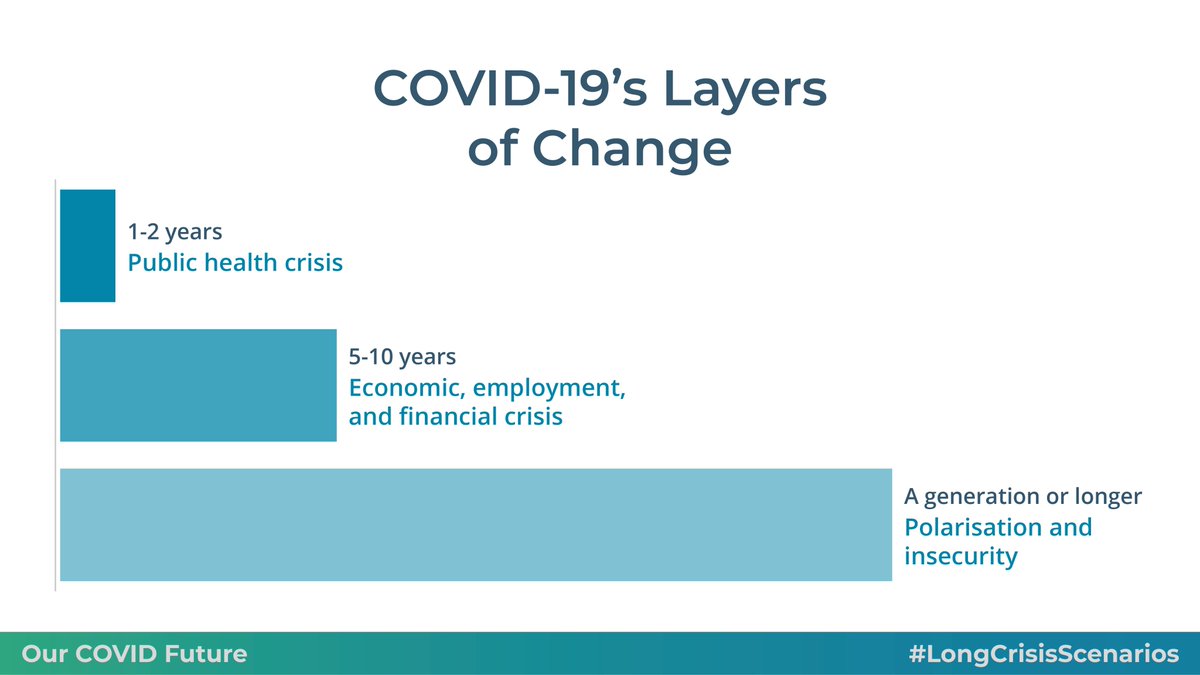 Public healthhttps://abs.twimg.com/emoji/v2/... draggable="false" alt="💰" title="Money bag" aria-label="Emoji: Money bag"> Economichttps://abs.twimg.com/emoji/v2/... draggable="false" alt="🥷" title="Ninja" aria-label="Emoji: Ninja"> InsecurityThese emergencies are unfolding together but at different speeds - and must be confronted simultaneously. [4/x]" title="We use this framework to explore three interlocking layers of the emergency.https://abs.twimg.com/emoji/v2/... draggable="false" alt="⚕️" title="Staff of aesculapius" aria-label="Emoji: Staff of aesculapius">Public healthhttps://abs.twimg.com/emoji/v2/... draggable="false" alt="💰" title="Money bag" aria-label="Emoji: Money bag"> Economichttps://abs.twimg.com/emoji/v2/... draggable="false" alt="🥷" title="Ninja" aria-label="Emoji: Ninja"> InsecurityThese emergencies are unfolding together but at different speeds - and must be confronted simultaneously. [4/x]" class="img-responsive" style="max-width:100%;"/>
Public healthhttps://abs.twimg.com/emoji/v2/... draggable="false" alt="💰" title="Money bag" aria-label="Emoji: Money bag"> Economichttps://abs.twimg.com/emoji/v2/... draggable="false" alt="🥷" title="Ninja" aria-label="Emoji: Ninja"> InsecurityThese emergencies are unfolding together but at different speeds - and must be confronted simultaneously. [4/x]" title="We use this framework to explore three interlocking layers of the emergency.https://abs.twimg.com/emoji/v2/... draggable="false" alt="⚕️" title="Staff of aesculapius" aria-label="Emoji: Staff of aesculapius">Public healthhttps://abs.twimg.com/emoji/v2/... draggable="false" alt="💰" title="Money bag" aria-label="Emoji: Money bag"> Economichttps://abs.twimg.com/emoji/v2/... draggable="false" alt="🥷" title="Ninja" aria-label="Emoji: Ninja"> InsecurityThese emergencies are unfolding together but at different speeds - and must be confronted simultaneously. [4/x]" class="img-responsive" style="max-width:100%;"/>
![Like everyone who thinks about the future, we also took inspiration from the famous Mont Fleur scenarios.Guided by @adamkahane @reospartners, they were created to explore South Africa’s direction as it escaped from apartheid. [5/x] https://reospartners.com/wp-conten... Like everyone who thinks about the future, we also took inspiration from the famous Mont Fleur scenarios.Guided by @adamkahane @reospartners, they were created to explore South Africa’s direction as it escaped from apartheid. [5/x] https://reospartners.com/wp-conten...](https://pbs.twimg.com/media/EY8UInPWkAA2CPD.png)
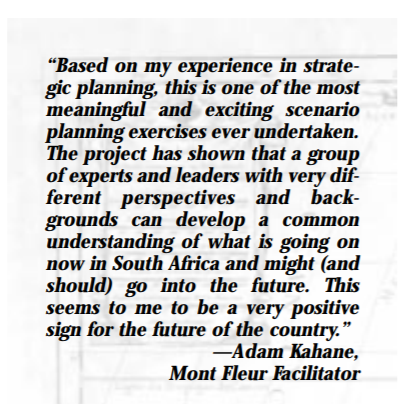 Plausible worlds not fantasy futures.https://abs.twimg.com/emoji/v2/... draggable="false" alt="2⃣" title="Keycap digit two" aria-label="Emoji: Keycap digit two"> Shared awareness – “a common vocabulary and mutual understanding”https://abs.twimg.com/emoji/v2/... draggable="false" alt="3⃣" title="Keycap digit three" aria-label="Emoji: Keycap digit three"> Platform for action – “We captured the way forward of those committed to finding a way forward.” [6/x]" title=" @adamkahane’s lessons from Mont Fleur.https://abs.twimg.com/emoji/v2/... draggable="false" alt="1⃣" title="Keycap digit one" aria-label="Emoji: Keycap digit one"> Plausible worlds not fantasy futures.https://abs.twimg.com/emoji/v2/... draggable="false" alt="2⃣" title="Keycap digit two" aria-label="Emoji: Keycap digit two"> Shared awareness – “a common vocabulary and mutual understanding”https://abs.twimg.com/emoji/v2/... draggable="false" alt="3⃣" title="Keycap digit three" aria-label="Emoji: Keycap digit three"> Platform for action – “We captured the way forward of those committed to finding a way forward.” [6/x]" class="img-responsive" style="max-width:100%;"/>
Plausible worlds not fantasy futures.https://abs.twimg.com/emoji/v2/... draggable="false" alt="2⃣" title="Keycap digit two" aria-label="Emoji: Keycap digit two"> Shared awareness – “a common vocabulary and mutual understanding”https://abs.twimg.com/emoji/v2/... draggable="false" alt="3⃣" title="Keycap digit three" aria-label="Emoji: Keycap digit three"> Platform for action – “We captured the way forward of those committed to finding a way forward.” [6/x]" title=" @adamkahane’s lessons from Mont Fleur.https://abs.twimg.com/emoji/v2/... draggable="false" alt="1⃣" title="Keycap digit one" aria-label="Emoji: Keycap digit one"> Plausible worlds not fantasy futures.https://abs.twimg.com/emoji/v2/... draggable="false" alt="2⃣" title="Keycap digit two" aria-label="Emoji: Keycap digit two"> Shared awareness – “a common vocabulary and mutual understanding”https://abs.twimg.com/emoji/v2/... draggable="false" alt="3⃣" title="Keycap digit three" aria-label="Emoji: Keycap digit three"> Platform for action – “We captured the way forward of those committed to finding a way forward.” [6/x]" class="img-responsive" style="max-width:100%;"/>
![But Mont Fleur was the culimation of a deep engagement by S Africa’s decision-makers.Whereas we’re starting the debate about Covid futures. #ScenariosWeek @globaldashboard from Monday, @localtrust seminar on 3 June, and @TheLongCrisis network. [7/x] https://localtrust.org.uk/big-local... But Mont Fleur was the culimation of a deep engagement by S Africa’s decision-makers.Whereas we’re starting the debate about Covid futures. #ScenariosWeek @globaldashboard from Monday, @localtrust seminar on 3 June, and @TheLongCrisis network. [7/x] https://localtrust.org.uk/big-local...](https://pbs.twimg.com/media/EY8V3wlXYAgLH8r.jpg)
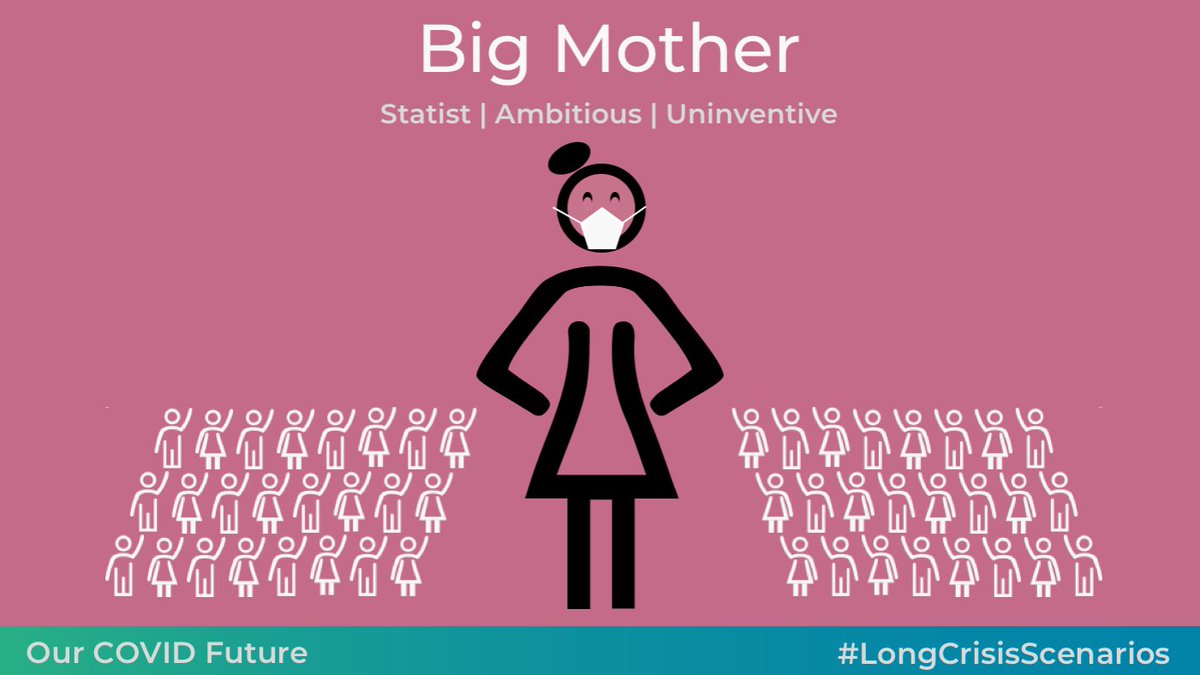 Big Mother is a world where politicians promise a lot and are expected to deliver.It owes a lot to ideas @alexevansuk and I picked up from Joseph Tainter on the dynamics of civilizations. [8/x] https://qcnr.usu.edu/directory..." title="Influences for each scenario.https://abs.twimg.com/emoji/v2/... draggable="false" alt="1⃣" title="Keycap digit one" aria-label="Emoji: Keycap digit one"> Big Mother is a world where politicians promise a lot and are expected to deliver.It owes a lot to ideas @alexevansuk and I picked up from Joseph Tainter on the dynamics of civilizations. [8/x] https://qcnr.usu.edu/directory..." class="img-responsive" style="max-width:100%;"/>
Big Mother is a world where politicians promise a lot and are expected to deliver.It owes a lot to ideas @alexevansuk and I picked up from Joseph Tainter on the dynamics of civilizations. [8/x] https://qcnr.usu.edu/directory..." title="Influences for each scenario.https://abs.twimg.com/emoji/v2/... draggable="false" alt="1⃣" title="Keycap digit one" aria-label="Emoji: Keycap digit one"> Big Mother is a world where politicians promise a lot and are expected to deliver.It owes a lot to ideas @alexevansuk and I picked up from Joseph Tainter on the dynamics of civilizations. [8/x] https://qcnr.usu.edu/directory..." class="img-responsive" style="max-width:100%;"/>
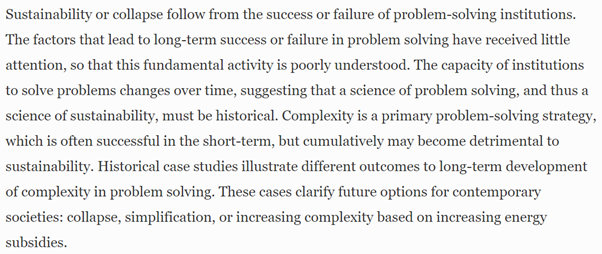 and a civilization prospers.https://abs.twimg.com/emoji/v2/... draggable="false" alt="❌" title="Cross mark" aria-label="Emoji: Cross mark"> and power devolves to a lower level of organization. [9/x] https://link.springer.com/article/1..." title="Tainter in a nutshell:Complexity is a civilization& #39;s response to unfamiliar problems.But it’s costly.So does it solve enough problems to justify its cost?https://abs.twimg.com/emoji/v2/... draggable="false" alt="✅" title="White heavy check mark" aria-label="Emoji: White heavy check mark">and a civilization prospers.https://abs.twimg.com/emoji/v2/... draggable="false" alt="❌" title="Cross mark" aria-label="Emoji: Cross mark"> and power devolves to a lower level of organization. [9/x] https://link.springer.com/article/1..." class="img-responsive" style="max-width:100%;"/>
and a civilization prospers.https://abs.twimg.com/emoji/v2/... draggable="false" alt="❌" title="Cross mark" aria-label="Emoji: Cross mark"> and power devolves to a lower level of organization. [9/x] https://link.springer.com/article/1..." title="Tainter in a nutshell:Complexity is a civilization& #39;s response to unfamiliar problems.But it’s costly.So does it solve enough problems to justify its cost?https://abs.twimg.com/emoji/v2/... draggable="false" alt="✅" title="White heavy check mark" aria-label="Emoji: White heavy check mark">and a civilization prospers.https://abs.twimg.com/emoji/v2/... draggable="false" alt="❌" title="Cross mark" aria-label="Emoji: Cross mark"> and power devolves to a lower level of organization. [9/x] https://link.springer.com/article/1..." class="img-responsive" style="max-width:100%;"/>
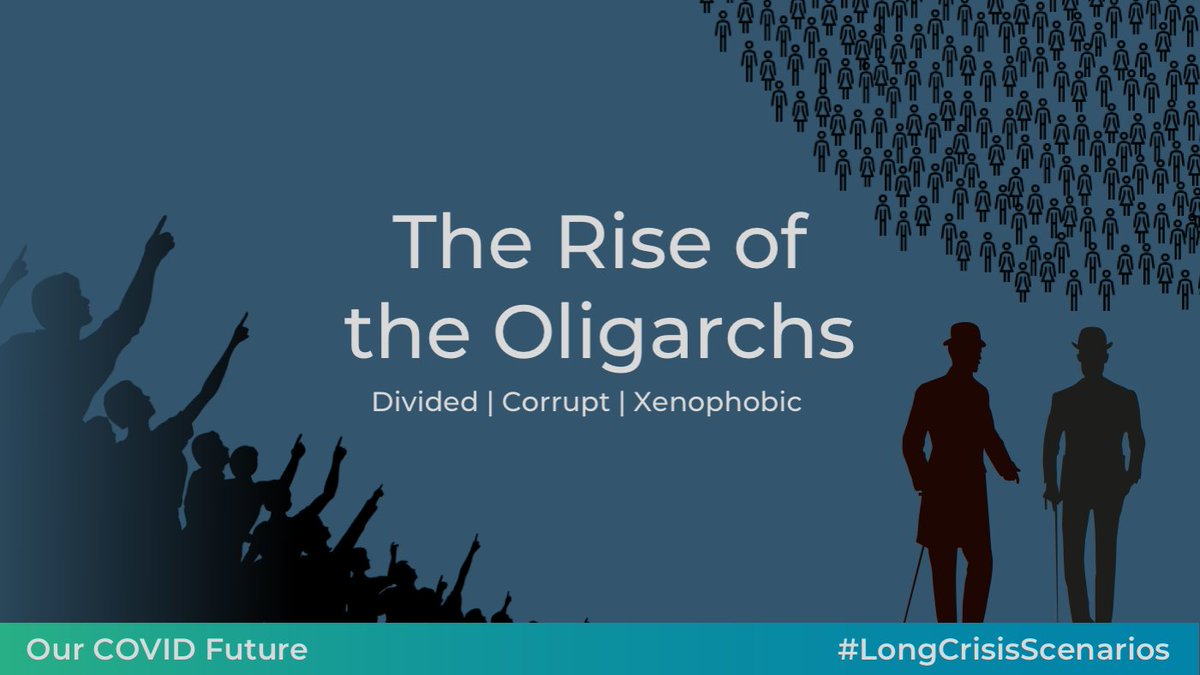 Rise of the Oligarchs is a government of the few not the many.One inspiration - @MartinGilens and Benjamin I. Page on the power of elites in American politics. [11/x]" title="https://abs.twimg.com/emoji/v2/... draggable="false" alt="2⃣" title="Keycap digit two" aria-label="Emoji: Keycap digit two"> Rise of the Oligarchs is a government of the few not the many.One inspiration - @MartinGilens and Benjamin I. Page on the power of elites in American politics. [11/x]" class="img-responsive" style="max-width:100%;"/>
Rise of the Oligarchs is a government of the few not the many.One inspiration - @MartinGilens and Benjamin I. Page on the power of elites in American politics. [11/x]" title="https://abs.twimg.com/emoji/v2/... draggable="false" alt="2⃣" title="Keycap digit two" aria-label="Emoji: Keycap digit two"> Rise of the Oligarchs is a government of the few not the many.One inspiration - @MartinGilens and Benjamin I. Page on the power of elites in American politics. [11/x]" class="img-responsive" style="max-width:100%;"/>
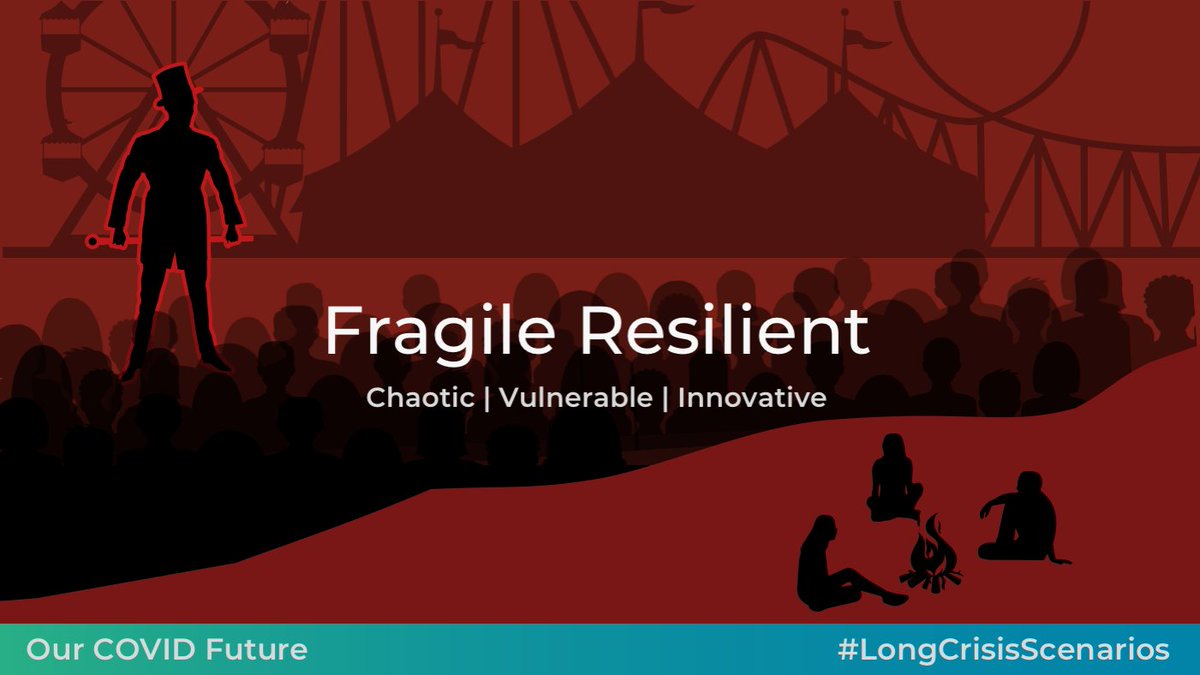 In Fragile Resilient we find hope at the grassroots – but at the centre things fall apart.And they do so noisily and dramatically.This scenario quotes @jayrosen_nyu [13/x]" title="https://abs.twimg.com/emoji/v2/... draggable="false" alt="3⃣" title="Keycap digit three" aria-label="Emoji: Keycap digit three"> In Fragile Resilient we find hope at the grassroots – but at the centre things fall apart.And they do so noisily and dramatically.This scenario quotes @jayrosen_nyu [13/x]" class="img-responsive" style="max-width:100%;"/>
In Fragile Resilient we find hope at the grassroots – but at the centre things fall apart.And they do so noisily and dramatically.This scenario quotes @jayrosen_nyu [13/x]" title="https://abs.twimg.com/emoji/v2/... draggable="false" alt="3⃣" title="Keycap digit three" aria-label="Emoji: Keycap digit three"> In Fragile Resilient we find hope at the grassroots – but at the centre things fall apart.And they do so noisily and dramatically.This scenario quotes @jayrosen_nyu [13/x]" class="img-responsive" style="max-width:100%;"/>
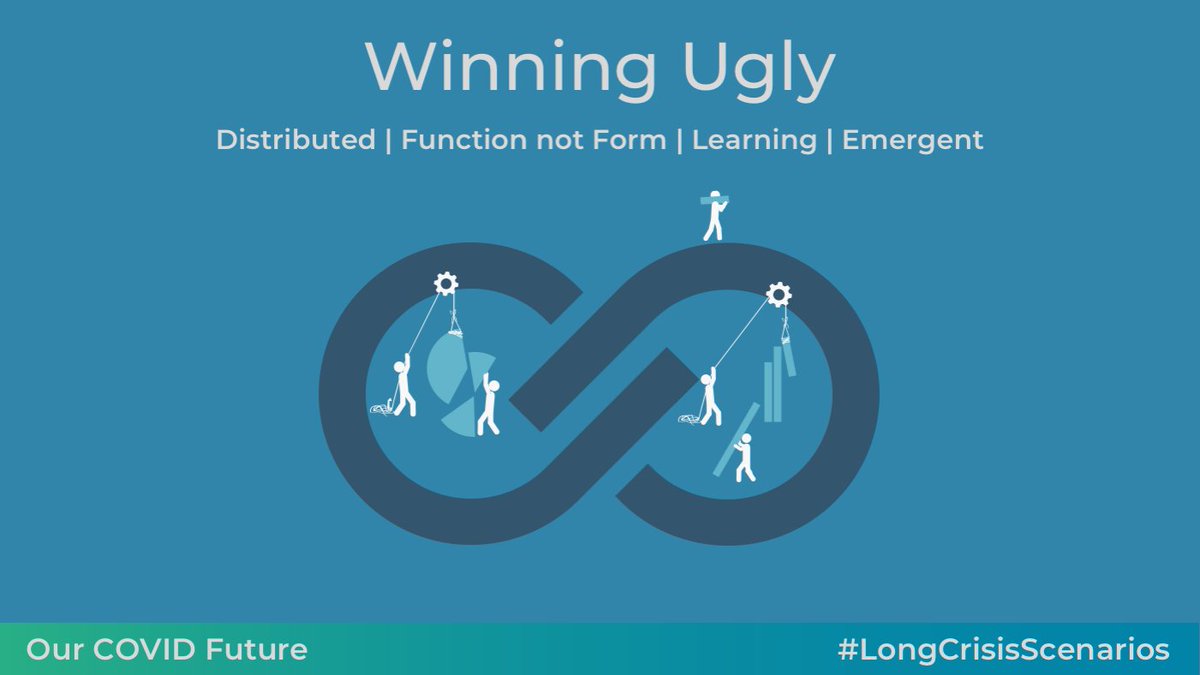 - Winning Ugly. A collective and distributed response to the public health, economic, and insecurity emergencies that is..."extended – and at times seemingly endless." [15/x]" title="And finally - https://abs.twimg.com/emoji/v2/... draggable="false" alt="4⃣" title="Keycap digit four" aria-label="Emoji: Keycap digit four"> - Winning Ugly. A collective and distributed response to the public health, economic, and insecurity emergencies that is..."extended – and at times seemingly endless." [15/x]" class="img-responsive" style="max-width:100%;"/>
- Winning Ugly. A collective and distributed response to the public health, economic, and insecurity emergencies that is..."extended – and at times seemingly endless." [15/x]" title="And finally - https://abs.twimg.com/emoji/v2/... draggable="false" alt="4⃣" title="Keycap digit four" aria-label="Emoji: Keycap digit four"> - Winning Ugly. A collective and distributed response to the public health, economic, and insecurity emergencies that is..."extended – and at times seemingly endless." [15/x]" class="img-responsive" style="max-width:100%;"/>
![This scenario is inspired by a tennis player. Brad Gilbert. Against supposedly more skilful opponents, he was famous for digging deep and using every tool he had to try and win.McEnroe was so enraged by losing to him at the US Open that he announced his retirement. [16/x] This scenario is inspired by a tennis player. Brad Gilbert. Against supposedly more skilful opponents, he was famous for digging deep and using every tool he had to try and win.McEnroe was so enraged by losing to him at the US Open that he announced his retirement. [16/x]](https://pbs.twimg.com/media/EY8ehYtX0AUK-i5.png)


